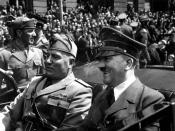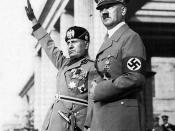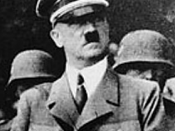Adolf Hitler Adolf Hitler was born in Australia, 1889. He was a poor student and rebellious. He wanted to study art and tried to get into an Art Academy, but he failed the exams. He was the son of Alois Hitler, an Austrian customs official. Hitler dropped out of high school, and after his mother's death in 1907, he moved to Vienna. In 1913, he settled in Munich, and in the beginning of WWI, he joined the Barvarian Army. In the war, he was gassed and wounded. He was a corporal and received the Iron Cross, for bravery. The war hardened his extreme nationalism, and he blamed the German defeat on betrayal by Jews and Maxists. When he came back to Munich, he joined a lot of other nationalistic veterans in the German workers' party.
In 1920, the German Workers' Party changed its name to the National Socialist German Workers, or Nazi Party.
In 1920, Hitler was elected chairman. He made it a paramilitary organization and won the support of prominent nationalists, such as Field Marshal Ludendorff. On Nov. 8 1923, Hitler attempted "beer-hall putsch", an attempt to overthrow the republican government. He led Bararian officials and, surrounded at a meeting in a Munich beer hall by the Nazi militia, or storm troopers, he made them swear loyalty to his "revolution". On regaining their freedom, they used the Reichswehr to defeat the coup. Hitler then fled, but he to, arrested right after that, got sentenced to five years in the Landsberg fortress. He only served one year.
This made Hitler known throughout Germany. In prison, he wrote Mien Kampf, which means "My Struggle". It became the Bible of National Socialism. The party grew slowly until the economic depression, beginning in 1929, and this brought it lots of support.
To Germans, burdened by reparation payments to the victors of WWI, and threatened by hyperinflation, political chaos, and a possible communist takeover, Hitler offered scapecoats and solutions. To the economically depressed, he promised to get rid of "Jew financiers." To workers, he promised security. He got financial support of bankers and industrialists with his anti "ÃÂ Communism and promises to control trade unionism.
Hitler had a keen insight into lots of psychology, and he was a master of intrigue and maneuver. After getting German citizenship from the state of Brunswick, he ran in the presidential elections of 1932. He lost to the popular war hero Paul von Hindenburg. He also strengthened his position by falsely promising to support Chancellor Franz von Papen, who lifted the ban on the storm troops in June of 1932.
The Nazis were elected the largest party in the Reichstag in July, 1932. Finding this out, Hindenburg offered Hitler a subordinate position in the cabinet. Hitler held out and so the chancellorship went to Kurt von Schleicher, who resigned on Jan. 28, 1933. Since this happened, the parliamentary government collapsed and pitched battles between Nazis and Communists. Hindenburg called Hitler to be chancellor of a coalition cabinet, refusing him extraordinary powers. Hitler took office on Jan. 30, 1933, supported by Alfred Hugenberg.
Germany's new ruler was a master of Machiavellian politics. Hitler was afraid of plots, and believed in his mission to achieve the supremacy of the so-called Aryan Race, which he called "master race." Having come to power he used brutality to carry out a "creeping coup" to turn the state into his dictatorship. After communists had been barred, and in spite of a display of storm trooper strength, the Reichstag voted to give Hitler dictoral powers.
Starting in the first days of Hitler's "Third Reich," political opponents, such as von Schleicher, and some Nazis, with them Ernst Roehm, they were all purged. Jews, Socialists, Communists, and others were hounded, arrested, or assassinated. He made government, law, and education appendages of National Socialism after the death of Hindenburg in 1934, the chancellorship was united to the person of the Fuhrer. So Hitler became the form of greeting, and a cult of Fuhrer worship was propagated. In 1938, with carefully natured scandal, Hitler dismissed top Army Commanders, dividing their power between him and faithful subordinates. As Hitler got ready for war, he replaced professional diplomats with Nazis. Many former disbelieves were converted by Hitler's diplomatic coups. He also played on the desire for peace and the fear of Communism with the bigger European states to achieve his expansionist goals. To stall retaliation, he claimed to be rectifying the Treaty of Versailles. Italy, in time became Germany's satellite. Hitler had Austrian chancellor Engelberg Dollfuss assassinated.
WWII with his nonaggression pact with stalin, annexed Latvia, Lithuania, and Estonia, the USSR and attacked eastern Poland. Although Hitler honored the pact, he only did so until he found it convenient to attack the USSR in June, 1941. In December, 1941, he assumed personal command of war strategy. It only led to disaster. In early 1943, he refused to admit defeat at the Battle of Stalingrad. He brought death to lots of German troops. As the war turned against Hitler, his horrible extermination of the Jews, was put to go, and he gave lots of power to Heinrich Himmler and the Gestapo, the much-hated street police, and the SS.
In July, 1944, the German military situation was desperate, and a group of high military and civil officials wanted and planned an assassination. Hitler survived and escaped a bomb explosion with very few injuries. Most of Hitler's plotters were executed. Even though the war was hopelessly lost by early 1945, Hitler insisted that the Germans fight on to the death. Along with the last German collapse in April, 1945, Hitler renounced Nazi leaders who wished to negotiate, and remained in Berlin when it was stormed by the Russians.
On April 29, Hitler married his long-time mistress, Eva Braun, and on April 30, they committed suicide together. They were in an underground bunker of the chancellery building, and they ordered that their bodies be burned. Hitler left Germany devastated. His legacy is one memory of the most dreadful tyranny of modern times.
I feel this is a tragedy because Adolf Hitler was a very horrible, misleading dictator. He hurt and brutally killed a lot of people- people who never did anything to him. He was a man who had a lot of hatred and problems. I feel sorry for him. I really don't understand who could have actually let something like that happen.


